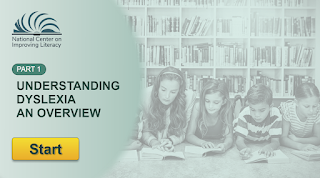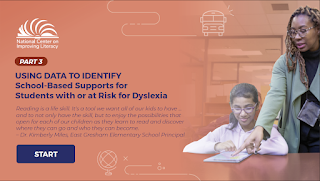If you haven't heard of Emily Hanford then you haven't been around the reading instruction/dyslexia world long enough. Emily Hanford is one of the reasons that the Science of Reading is such a big conversation right now. And...she's a fabulous journalist and weaver of stories. Not fictional stories, but the real horrifying truths about reading in the US.
You may have seen on my Educate Yourself page, the link to APM Reports. Originally, that was a link to the series Hard To Read and now it is also a link to Sold a Story. In fact, you can listen to a whole series of stories by Emily Hanford that will be enlightening, disturbing, and anger-inducing - whatever your emotion is, it will be provoked by these stories.
A connection
You know, I started work at the University of Oregon in February 2004. My then-fiancé was still overseas and I was deep into planning my wedding. My first day on the job? An Institute on Beginning Reading (IBR) that was being held at a Jantzen Beach hotel in Portland. It was the first of several IBRs that I would attend over the next few years because I was the event planner for the Oregon Reading First Center (ORFC) and the Western Regional Reading First Technical Assistance Center (WRRFTAC).
If you've been following Sold a Story, you may know where this is going.
I was 28 years old. I had a bachelor's degree in creative writing. I was about to get married. I was planning to start a family (as soon as my soon-to-be husband was out of the National Guard). And I knew absolutely NOTHING about teaching reading, how kids learned to read, or that there were different camps of belief in how to go about that teaching. It would be much later that I would connect my own slow, laborious reading with dyslexia.
It turned out that I didn't need to know any of those things to do my job. But as it happened, my job was really pretty much done once people were settled in their seats and listening to presenters. That meant I could sit down and listen if I wanted to as well. And I absorbed information as the years passed - listening to people like Anita Archer and Jan Hasbrouk talk about good instruction and assessment.
Sidebar: if you haven't ever heard Anita Archer speak, I encourage you to find some of her presentations online. She's wonderful. Here's a quick video that you can watch.
A shift, but still in the reading world
As Reading First (RF) started to implode nationally, I was on to thinking about having another baby, our first being born in 2006. The funding for RF was going to end and I was going to have to find another position. But, because I knew I was planning to get pregnant again, I didn't think I wanted to change departments. The director of ORFC was also changing positions. She was starting a little free reading clinic right there in our department and she needed an assistant. She told me that the job was mine. That it would not be challenging and I might even find it boring, but I could keep my .8 FTE Schedule. Since the first task was to build a website for the new clinic, I decided I was in.
So there I was, in 2008, helping to start a reading clinic that provided reading instruction one-on-one to students in Kindergarten through 5th grade. We did a soft launch with flyers in schools. We had more than 100 kids on our waitlist before we even got started. I think we started by serving 16 kids...I can't remember, but once we got going, we served 30 kids every term.
Originally the idea for this clinic was to bring kids up to grade level and send them on their way. We discovered in that first year that proving good instruction for 45 minutes a day, twice a week wasn't going to do it and we continued to have a growing waitlist even though we didn't advertise. So, we put a cap on it and served kids for up to 5 terms.
Maybe this should have been a glaring red flag to me that reading instruction was broken in our area, but remember, my only experiences with reading instruction was LITERALLY with the people who wrote the Direct Instruction programs that are talked about in Sold a Story.





